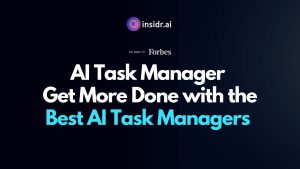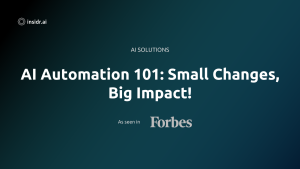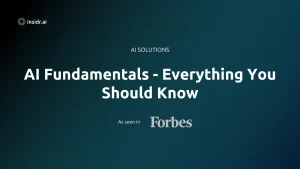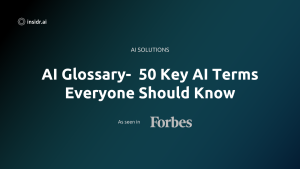In this digital age, enterprise artificial intelligence (AI) is the key to innovation, optimization and competitiveness for businesses.
Digital transformation is crucial in modernizing technology infrastructure to support business growth. As AI advances, enterprises across all industries are adopting it to solve complex problems, streamline processes and get deeper insights.
This guide covers what is enterprise AI, its benefits and challenges, applications and how to implement it successfully.
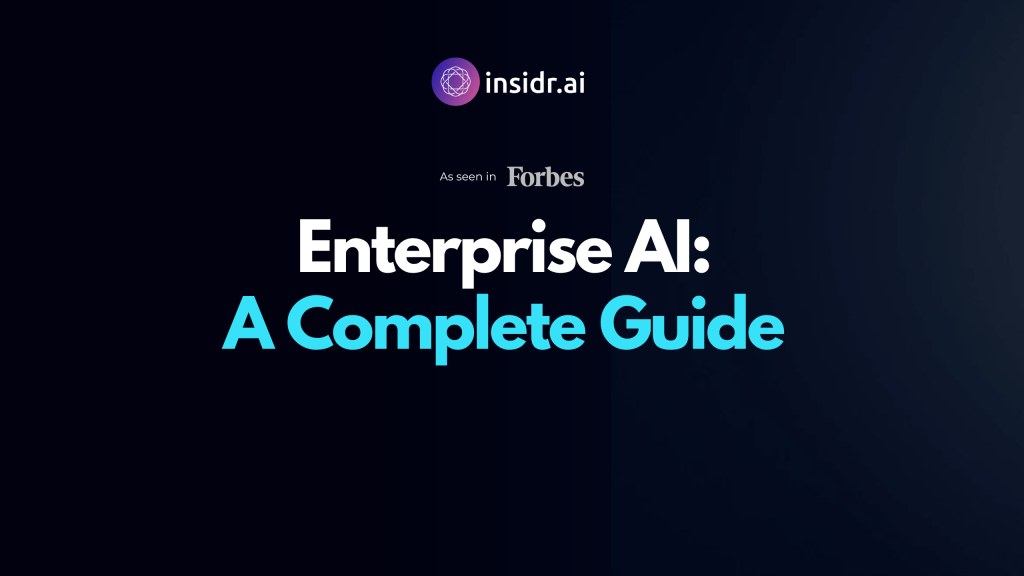

What is Enterprise AI?
Enterprise AI is the use of artificial intelligence technologies within an organization to solve business problems.
Unlike simple automation tools, enterprise AI uses advanced techniques like machine learning, deep learning and natural language processing (NLP) to mimic human intelligence.
The aim is to automate complex processes, improve decision making and create solutions that align with the company’s goals.
Enterprise AI goes beyond basic task automation, into areas that require nuanced decision making and adaptability.
By integrating with existing enterprise systems, enterprise AI can optimize operations and streamline workflows.
Using large datasets and complex algorithms, it uncovers actionable insights, improves operational efficiency, and drives innovation across departments from customer service to finance and beyond.
Definition and Explanation
Enterprise AI refers to the strategic application of artificial intelligence technologies to drive business outcomes and enhance operational efficiency within an organization.
Unlike basic automation tools, enterprise AI leverages advanced techniques such as machine learning, natural language processing (NLP), and other AI technologies to automate complex processes, improve decision-making, and create innovative products and services.
At its core, enterprise AI aims to solve well-defined business problems within an organizational context.
This requires reliable data, diverse skill sets, and solutions that are explainable and transparent.
By integrating AI into various business functions, companies can unlock new opportunities for growth, streamline operations, and stay competitive in an increasingly digital landscape.
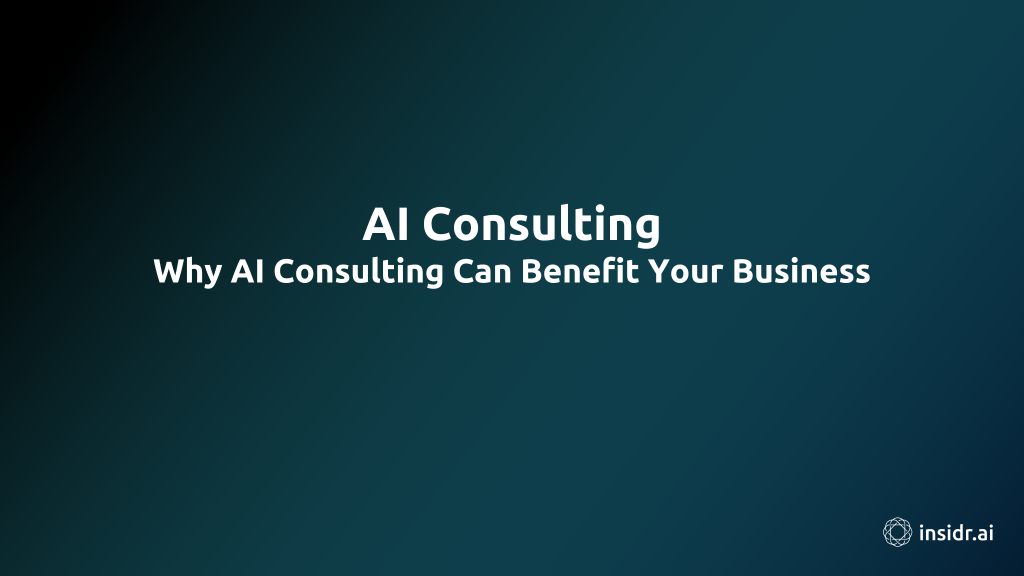
Benefits and Challenges of Enterprise AI
Enterprise AI platforms allow organizations to automate repetitive tasks, optimize resource allocation, and streamline workflows.
By leveraging ai and machine learning, enterprises can enhance operational efficiency through practices like MLOps and LLMOps, which apply DevOps principles to AI development.
This means higher productivity and operational efficiency. Through intelligent automation, enterprises can allocate resources better, reduce errors, and let employees focus on strategic tasks that add more value to the business.
AI also helps in customer experience by personalizing interactions. AI-driven tools can analyze customer data to provide recommendations, offer 24/7 support through virtual assistants, and deliver engaging consistent interactions that build loyalty.
These benefits mean big cost savings and competitive advantage in today’s fast-changing business world.
Challenges and Considerations
While the benefits of enterprise AI are many, it’s not without its challenges. Some of the challenges are:
- Data Security: Handling large amounts of sensitive data raises data privacy and security concerns.
- Algorithmic Bias: AI systems can inadvertently embed biases if not designed and monitored properly.
- Technical and Training: Adopting AI requires not just technological infrastructure but also training staff to work with new systems.
- Cultural Resistance: A shift to AI may face resistance from employees who fear job displacement or changes in workflow. To overcome these challenges you need to plan strategically, invest in employee training and communicate transparently within the organization.
Enterprise AI Applications
Virtual Assistants and Chatbots
AI powered chatbots and virtual assistants have changed the way companies interact with customers and manage internal processes.
These AI tools streamline customer support by handling inquiries, resolving issues and providing instant responses 24/7.
They not only improve customer experience but also reduce service costs, with reports showing chatbots can reduce customer service costs by up to 30%.
Also 87% of customers are comfortable with chatbots, so there’s broad acceptance and satisfaction with this AI driven service.
Predictive Maintenance and Risk Management
Enterprise AI can do predictive maintenance by analyzing sensor data to find patterns and predict equipment failures.
This proactive approach helps organizations move from reactive to preventive maintenance, reduce downtime and extend asset life.
AI powered predictive models also help in risk management so businesses can address issues before they escalate. These predictive insights reduce errors and support safer operations, ultimately improve operational resilience.
Enterprise AI Platforms and Software
Enterprise AI platforms are comprehensive solutions that provide tools to build, deploy, and manage AI models and applications at scale.
These platforms play a crucial role in the evolution and increasing significance of enterprise software for businesses, helping them to use their data better, simplify operations, and drive innovation.
Powered by robust data intelligence engines, these platforms break down data silos, improve data access, and automate tasks for faster insights and decision making.
Overview of Enterprise AI Platforms
Enterprise AI platforms are comprehensive software solutions designed to enable organizations to develop, deploy, and manage AI models and applications across different business functions.
These platforms provide a unified environment where data scientists, developers, and business users can collaborate to build AI-powered solutions that drive innovation and efficiency.
Key features of enterprise AI platforms typically include data preparation, model training, model deployment, and model monitoring.
These platforms help businesses harness the power of their data, simplify complex processes, and accelerate the development of AI solutions.
By breaking down data silos and automating tasks, enterprise AI platforms empower organizations to make faster, data-driven decisions and achieve their strategic goals.
Implementing Enterprise AI
Defining Business Goals and Use Cases
The first step in implementing enterprise AI is to define specific business goals and identify use cases where AI can add value.
By aligning AI initiatives with clear objectives companies can get maximum impact and ROI. Exploring various AI use cases and choosing the ones that best fit the organization’s goals means a targeted and effective AI strategy.
Assessing Data and AI Readiness
Enterprise AI Strategy and Planning
An enterprise AI strategy must weigh in-house versus partner-led implementation.
Enterprise AI solutions can significantly transform business operations by offering benefits such as cost reduction, efficiency gains, and innovation.
However, implementing these solutions comes with challenges and considerations, particularly regarding data security and the choice between in-house and external implementation strategies.
While in-house deployment gives more control, working with AI specialists brings much-needed expertise, especially for organizations with no AI experience.
By assessing available resources, including budget and human capital, companies can decide what’s best for their needs.
Generative AI and Enterprise AI
Generative AI is a category of AI that can create new content autonomously. With advanced models coming out, generative AI is evolving fast and bringing new opportunities for business.
Generative AI can automate tasks, improve decision making and help create new products and services, so it’s a big opportunity for companies to enhance their offerings.
Join the Insidr AI Community

If you’re looking to take your agency to the next level by integrating AI solutions, join the Insidr AI Community.
Here, you’ll get access to exclusive resources, tutorials, and expert advice on how to successfully sell AI services and generate high-ticket clients.
Click here to join and start scaling your agency today.
Enterprise AI Examples and Success Stories
Overview of Generative AI
Generative AI stands as an intriguing advancement in artificial intelligence, utilizing machine learning algorithms to create new content, such as text, images, or videos.
In enterprise settings, generative AI has numerous applications, including content creation, data augmentation, and predictive modeling.
Generative AI can automate routine tasks, enhance productivity, and improve customer experiences by creating personalized content and solutions.
For example, it can generate marketing materials, simulate scenarios for training purposes, or create synthetic data to augment real-world datasets.
However, the use of generative AI also raises important concerns about data quality, bias, and ethics. Organizations must address these issues through careful planning, transparent practices, and ongoing monitoring to ensure responsible and effective use of generative AI technologies.
By understanding and leveraging the potential of generative AI, businesses can unlock new opportunities for innovation and growth, while also navigating the challenges associated with this powerful technology.
In-House vs. Partner-Led Implementation
When it comes to implementing an enterprise AI platform, organizations have two primary options: in-house implementation or partner-led implementation.
In-house implementation involves leveraging internal resources and expertise to design, develop, and deploy the AI platform.
This approach offers greater control and customization but requires significant investment in talent and infrastructure.
On the other hand, partner-led implementation involves collaborating with an external partner who specializes in AI. This approach can provide access to advanced expertise and accelerate the deployment process, especially for organizations with limited AI experience.
However, it may also involve higher costs and less control over the customization of the platform. The choice between these approaches depends on the organization’s specific needs, resources, and strategic goals.
Resource Allocation and Collaboration
Successful implementation of an enterprise AI platform hinges on effective resource allocation and collaboration.
Organizations must allocate sufficient resources, including budget, personnel, and infrastructure, to support the development and deployment of AI models and applications.
This involves investing in the right tools, technologies, and training programs to build a robust AI capability. Collaboration is equally critical.
Data scientists, developers, and business users must work together to ensure that AI solutions align with business needs and are seamlessly integrated into existing systems and processes.
By fostering a collaborative environment, organizations can leverage diverse perspectives and expertise to create AI solutions that deliver tangible business value.
Industry Specific Applications
Enterprise AI applications span across multiple industries, each using AI to drive business value. For example AI improves customer experience through personalized recommendations, forecasts sales better, supports predictive maintenance and detects fraud.
AI solutions solve real world problems and help businesses across industries to achieve their goals better.
Real World Success Stories
Several industry leaders are already benefitting from enterprise AI. Databricks for example enables organizations to use enterprise AI with its Data Intelligence Platform and companies across industries.
SEGA uses Databricks to deliver better gaming experiences, Walgreens uses AI to personalize pharmacy care and improve patient outcomes. These examples show how enterprise AI can drive innovation and deliver transformational results.
Conclusion: The Future of Enterprise AI
As AI evolves it will change businesses in profound ways. Established AI techniques like machine learning and emerging technologies like generative AI and copilots are making organizations more productive, better decision makers and more creative.
Early adopters of enterprise AI are already seeing the benefits, so AI in business is not just a trend but a necessity to stay relevant in the digital world. To become an AI driven enterprise is more than just adopting the latest platform. It’s about creating a culture that’s AI friendly, encourages learning and innovation.
In an era where adaptability and data driven insights are key, enterprise AI is a powerful tool that solves today’s problems and sets up for future growth and success.
Discover More AI Tools
Join the free AI community to get free AI resources, join discussion, and learn how to use AI.
To subscribe to the newsletter and receive updates on AI, as well as a full list of 500+ AI tools, click here.



